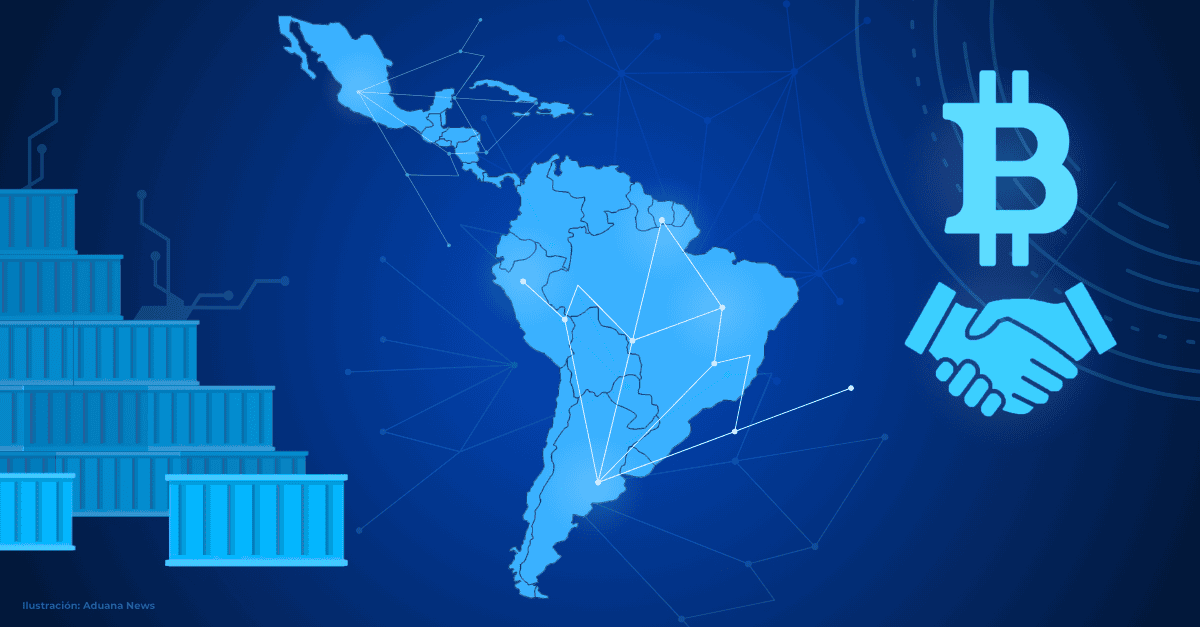Fraud, delays, lost documents, redundant procedures and processes that navigate without interinstitutional coordination by parallel channels. Although it may seem like something from another time, this is still the reality of a large part of the foreign trade in Latin America. In a global context that requires speed, traceability and legal certainty, the region continues to work under rigid bureaucratic structures that undermine its systemic competitiveness. However, an emerging technology promises to change this landscape radically: blockchain.
The disruptive potential of blockchain lies in its ability to generate unchangeable, testable and common digital records among several parties in a commercial transaction. Certificates of origin, phytosis licenses, freight customs (E-BL), commercial invoices, credits and import permits can be saved and verified in real time without the necessary. The experience of countries such as Singapore and the United Arab Emirates that have integrated blockchain into their national foreign trade platforms shows that this is not an abstract technological promise, but a specific instrument for system transformation.
In fact, the latest regional trade agreements (RTAs) such as the CPTPP, the RCEP, DAPA and the digital EU singapore already contain specific provisions on digital interoperability, the use of distributed technologies, the recognition of advanced electronic signatures and the development of interoperable electronic individual windows. This regulatory development reflects a new phase in the legal architecture of global trade, in which not only tariffs are to be eliminated or the rules of origin should be simplified, but also provide technological mechanisms that guarantee efficiency, traceability and predictability. The facilitation of digital trade is thus consolidated as a new government standard.
In Latin America, where documentary flows often circulate in paper form or as digital files via e -mail, the introduction of blockchain is a strategic opportunity to close structural gaps. A system in which customs, health authorities, banks and exporters access a single, synchronized and validated data record from the source enables the automation of critical processes, such as: B. ratification of certificates, freight release and cross -border payments. The inclusion of smart contract-understandable programs that are activated when certain contractual conditions are fulfilled-sets up an automation logic that minimizes human intervention, reduces time and eliminates operational friction. This phenomenon was referred to in various international forums as a “silent revolution”.
In order for this revolution to be effective and scalable, some institutional challenges have to be overcome. First of all, regulatory adjustment is required in order to recognize the functional and proven equivalence of electronic documents that are output and stored using the blockchain technology. This includes adapting national legislation for foreign trade, customs, commercial law and procedural law. Second, it is important to promote the technical training of civil servants and private operators and to ensure the interoperability of systems at regional level. The creation of Sandboxes Regulatory, the standardization of technological interfaces and the signing of mutual recognition agreements (MRAS) between responsible authorities are important steps in this direction.
The main obstacle is not the technology already available and proven-especially institutional fragmentation and the lack of cross-border digital government. The region has to move to the establishment of a regulatory and operational ecosystem based on the principles of openness, security, technological sovereignty and cooperation. In this sense, regional agreements have to go beyond the letter and consolidate as effective platforms for digital integration in the pursuit of the merchant championship.
In addition, the relevance of blockchain goes beyond its operational effects. It is also an opportunity to strengthen institutional integrity. In contexts in which customs care, an official discretion or the smuggling or the smuggling undermine into the system, it can be a powerful instrument to strengthen the rule of law. In this sense, blockchain is not just a technological instrument: it is a means of government and transparency.
The modernization of foreign trade is not just an economic necessity. It is a prerequisite for the political, legal and institutional sector. Latin America faces a historical opportunity to align his trading processes on global best practices. What is at stake is not just an improvement in logistics costs. It is the possibility to integrate into the trade under conditions equality, legality and trust in the trade of the 21st century.

| Ana Basco is director of Insight Lac. It is an economist and political scientist at the University of Buenos Aires (UBA) with more than 20 years of professional experience in the areas of sustainable development, regional integration and technological transformation. Your postgraduate studies in regional integration and international business of institutions in the USA and Europe enabled it to develop a global and strategic vision in order to drive the transformation of Latin America into a more integrated and sustainable future.
Throughout her career, Ana has a key role in international organizations such as the Interamerican Development Bank (IDB), where she headed the Institute for the Integration of Latin America and the Caribbean (Intal). In this role she directed multidisciplinary teams and promoted research and cooperation with trade, regional integration, artificial intelligence and sustainable development. As an academic, Ana teaches courses on economic, human and social development at the university level and published numerous studies, articles and books on regional integration, sustainable trade, the digital gender gap and the fourth industrial revolution. Your work has contributed to strengthening the connections between academies and the agenda of development cooperation. |

Lautaro M. Ramirez is a lawyer, has a master's degree in Latin American integration and specialist for integration policy at the National University of La Plata. He has a diploma in trade and environment from American University, Washington DC, and a postgraduate degree in “Law, Business and Politics in a comparative perspective: European Union and Mercosur” from the University of Bari, Italy.
In the Argentine Public Sector, He Served as Technical Advisor to the Ministry of Agriculture of the Nation, in the Negotiations of the Mercosur-EU Agreement (2009-2010), to the Ministry of Production of the Nation for Compliance with Case DS438: Argentina-Measures Affecting the Import of Goods (2015-2016), Director of Commerce of the Province of Buenos Aires (2017-2018) and advisor to the agency for promoting investments and foreign trade. He was a rapporteur of the foreign trade commission of the honorable chamber of the members of the province of Buenos Aires (2019-2021).
At the international level, he worked as a legal consultant and consultant from various international organizations for regional economic integration and market access such as Aladi, OAS, IDB-Intal, Sela and WTO. He teaches Bachelor and Graduate courses in Argentina and abroad. He is the head of the consulting company L3Comex and Associate at Insight Lac.
